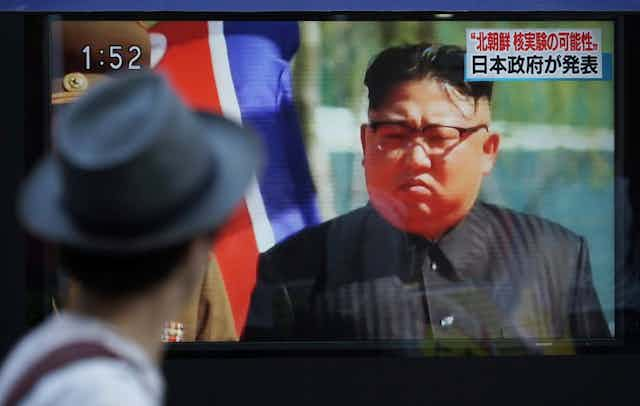As if anyone needed convincing, it’s clearer than ever that Kim Jong Un’s one-man arms race is that of a madman with anger issues who needs to command unqualified fear and compliance.
In recent days it’s become difficult to keep up with developments as North Korea conducts a stream of menacing “tests.”
They started with an outrageous missile launch over Japan (described as a practice run for Guam) and escalated with claims about developing a massively potent hydrogen bomb and a long-range missile that can deliver it to the heart of North America.
Pyongyang’s dangerous game of “Korean roulette” makes responses like trade sanctions or joint naval exercises seem like kindergarten fare. As the world sputters in fury, North Korea — supported by China — keeps perfecting a nuclear capacity that threatens world peace.
The time for boilerplate statements by Canada — expressing regret, urging restraint on all sides — has passed. The next border a Korean missile crosses could very likely be ours.
Korean reunification is paramount
North Korea’s relentless flouting of international law demands a more serious, coordinated response by the international community, including Canada.
Increasingly, the only resolution is to reunify the Korean peninsula through United Nations action, and use South Korea’s considerable resources to reconstruct the North.
The biggest factor blocking Korean unification is China, where I worked as a counsellor at the Canadian embassy in Beijing for years. It is increasingly clear that Beijing’s enabling of the appalling North Korean regime — through transfer of critical technology, food and energy aid — is part of China’s larger plan for East Asia.
The end game is for North Korea to bring about an implacable crisis. China can then exploit the crisis to negotiate the withdrawal of U.S. forces from Japan and South Korea as part of its grand bargain to resolve Pyongyang’s nuclear threat.
This paves the way for China to retake Taiwan, and to bring all of East and Southeast Asia into its economic and strategic orbit.
This Chinese power gambit has too much potential for geopolitical calamity for us to stand idly by and watch it play out unanswered.
So where does Canada stand?
Canada is trade-focused
Ottawa is so focused on riches from Canada-China free trade that we have given tacit consent to China’s illegal regional expansion. This despite our faint lip-service support of a ruling by the Permanent Court of Arbitration in The Hague that China’s building of military bases on reefs and outcrops in the South China Sea is a violation of international law.
Canada could show some moral spine and join the United States and other countries in what are known as freedom-of-navigation naval exercises, essentially Navy patrols throughout the disputed waters aimed at countering China’s maritime claims.

But Ottawa is afraid China would punish Canada over such a move, possibly reimposing restrictions on our billion-dollar export of canola seeds into China.

The Canada-China free-trade negotiations would be suspended, as would high-level official visits with panda bear photo ops and huge business contracts. And that’s just for starters.
After the missile launch, Canadian Foreign Affairs Minister Chrystia Freeland’s delayed statement 24 hours later ended with our usual whimper: “We call on North Korea to cease these provocations, comply with its obligations and immediately and verifiably abandon its ballistic missile program. Canada supports international measures that encourage North Korea to abandon its nuclear and ballistic missile programs and resume dialogue toward a political solution.”
Kim dictatorship must come to an end
If Canada is serious about playing a meaningful role in international relations, it’s time for us to join with our allies and form an action plan for North Korea that has more credibility than U.S. President Donald Trump’s “fire and fury” rhetoric.
The inescapable fact is that the Kim dictatorship in North Korea has to be brought to an end. More China-mediated years of polite dialogue will not bring that about.
The South Koreans must become more focused on the end game of reunification — now, not later — and accept that the end of the Kim dynasty in North Korea will come at considerable cost to South Korea in terms of the high price tag on reconstruction and poverty relief for Koreans.
The demise of China’s economic and political influence in the North can no longer be deferred, and meaningful measures must be taken to minimize the loss of civilian life before horror unfolds.
China’s ‘sly backing of atrocious ally’
Canada must reverse its position and start cooperating with the United States on North American missile defence. It should also ban Canadian businesses from collaborating with Chinese state banks or trading companies that support North Korea by way of UN sanctions violations.
It’s time for our government to state clearly that Canada condemns China’s continued sly backing of its atrocious North Korean ally. China is obstructing the deeply held aspirations of Korean people to reunite their broken country and to rebuild a peaceful, prosperous and democratic nation on the Korean peninsula.
Sixty-seven years ago, Canada made a military commitment to defend South Korea against North Korean and Chinese military aggression, at a loss of over 500 Canadian lives.
If Canada is truly back in international diplomacy now, it must stand firm today against a much greater threat — North Korea, helmed by a madman and backed by mighty China.

